Newmark Bundle
Who Really Controls Newmark?
Unraveling the Newmark SWOT Analysis is just the beginning; understanding its ownership structure is key to grasping the inner workings of this commercial real estate giant. Knowing who owns Newmark unlocks insights into its strategic decisions, financial health, and future prospects. From its roots in 1929 to its current global footprint, the evolution of Newmark's ownership tells a compelling story.
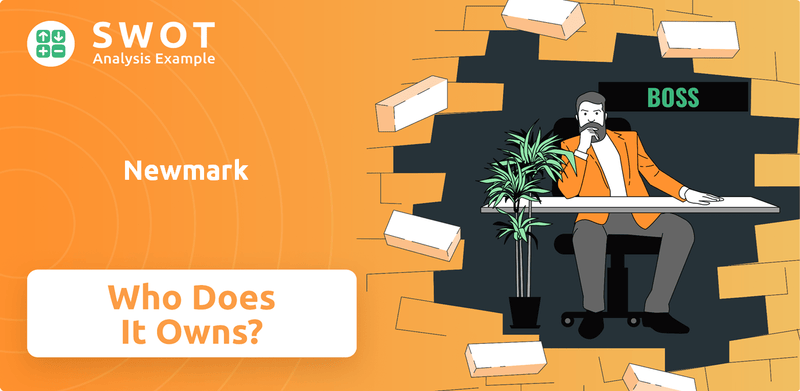
This exploration of Newmark ownership will examine the transition from its founding to its current status as a publicly traded company. We'll delve into the major shareholders, including institutional investors and public shareholders, and how these entities influence the company's direction. Understanding who owns Newmark is essential for anyone looking to invest in or understand the dynamics of the Newmark real estate market and its overall financial performance.
Who Founded Newmark?
The story of the company began in 1929 in Manhattan, founded by Dave Newmark. The firm's trajectory shifted significantly with the entry of Aaron Gural, who later became the owner in 1956.
Gural's leadership, which spanned from 1957 to 1998 as Chairman, was crucial in shaping the company's early strategy. This involved a combination of brokerage services and strategic property investments within Manhattan.
In 1978, Jeffrey Gural and Barry Gosin took ownership, with Barry M. Gosin currently serving as CEO and Michael J. Rispoli as CFO. The current leadership has been instrumental in the company's modern growth.
Dave Newmark founded the company in 1929 in Manhattan. Aaron Gural acquired the company in 1956.
Aaron Gural served as Chairman from 1957 to 1998. Barry M. Gosin is the current CEO.
Jeffrey Gural and Barry Gosin took ownership in 1978. Michael J. Rispoli is the current CFO.
The early strategy involved combining brokerage services with property investments. The focus was on acquiring properties in Manhattan.
The company's ownership transitioned from Dave Newmark to Aaron Gural. Later, Jeffrey Gural and Barry Gosin took over.
Barry M. Gosin currently serves as the CEO of the company. Michael J. Rispoli holds the position of CFO.
Understanding the Newmark ownership structure and Newmark history provides insight into its evolution. Key figures like Aaron Gural and the current leadership have played pivotal roles. The company's focus on Manhattan properties and brokerage services highlights its strategic approach. For more details, you can check out an article about Newmark real estate.
- Dave Newmark founded the company in 1929.
- Aaron Gural purchased the company in 1956.
- Jeffrey Gural and Barry Gosin took ownership in 1978.
- Barry M. Gosin is the current CEO.
Newmark SWOT Analysis
- Complete SWOT Breakdown
- Fully Customizable
- Editable in Excel & Word
- Professional Formatting
- Investor-Ready Format
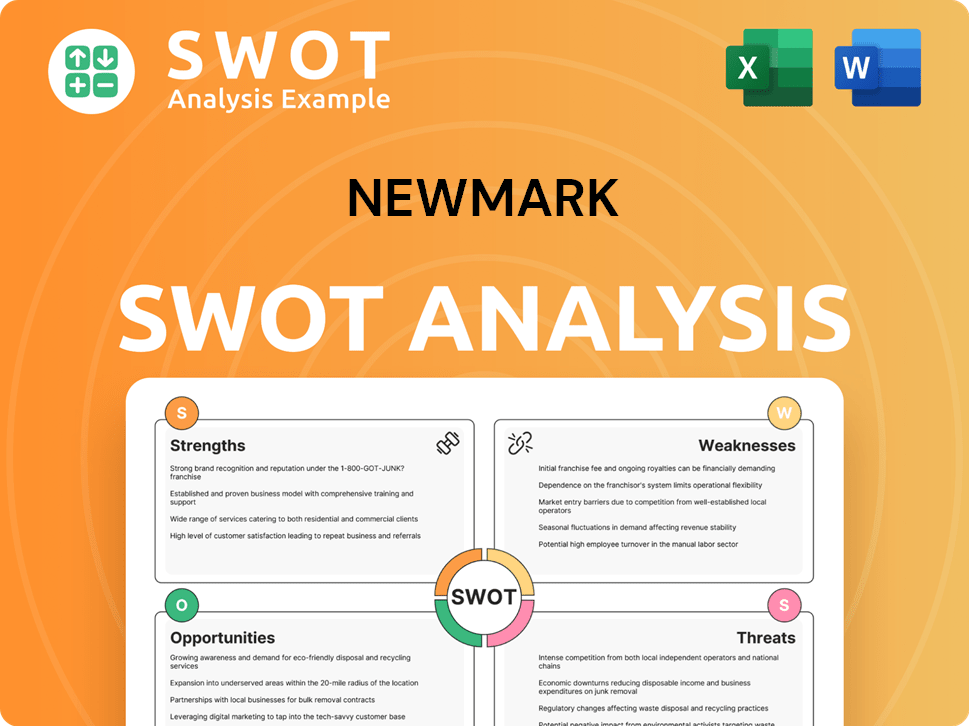
How Has Newmark’s Ownership Changed Over Time?
The ownership of the Newmark company has evolved significantly. Originally a family-owned business, it transitioned through several stages, including acquisition by BGC Partners. This acquisition, finalized in October 2011, marked a pivotal moment, providing Newmark with capital and expanding its global presence. Howard W. Lutnick, Chairman and CEO of BGC, became Chairman of Newmark, while Barry Gosin remained CEO.
A major shift occurred in December 2017 when Newmark Group, Inc. went public through an Initial Public Offering (IPO). The IPO, priced at $14.00 per share, saw the company listed on the NASDAQ under the symbol 'NMRK'. Later, in 2018, Newmark was spun off from BGC Partners, becoming an independent publicly traded company. This transformation reshaped the company's ownership structure, introducing a mix of institutional and individual investors.
| Event | Date | Impact |
|---|---|---|
| BGC Partners Acquisition | October 2011 | Provided capital and expanded global reach. |
| Initial Public Offering (IPO) | December 15, 2017 | Made Newmark a publicly traded company. |
| Spin-off from BGC Partners | 2018 | Established Newmark as an independent entity. |
Currently, Newmark's ownership is diverse, with no single entity holding a majority stake. Institutional investors collectively own a significant portion, approximately 63.06% as of March 2025. Key institutional shareholders include The Vanguard Group, Inc. (13.19%), BlackRock Fund Advisors (6.18%), and Dimensional Fund Advisors LP (4.11%) as of March 31, 2025. Individual investors hold a 21% stake. Barry Gosin, the Newmark CEO, held 2.796% of shares outstanding, or 4,188,622 shares, as of March 2025. Cantor Fitzgerald remains the largest and controlling shareholder. For a deeper dive into Newmark's strategic growth, consider reading about the Growth Strategy of Newmark.
The ownership of Newmark, a major player in Newmark real estate, has shifted from family ownership to a publicly traded model.
- Institutional investors hold a significant portion of the company's shares.
- The IPO in 2017 marked a significant turning point.
- Barry Gosin, the Newmark CEO, maintains a notable shareholding.
- Cantor Fitzgerald remains a controlling shareholder.
Newmark PESTLE Analysis
- Covers All 6 PESTLE Categories
- No Research Needed – Save Hours of Work
- Built by Experts, Trusted by Consultants
- Instant Download, Ready to Use
- 100% Editable, Fully Customizable
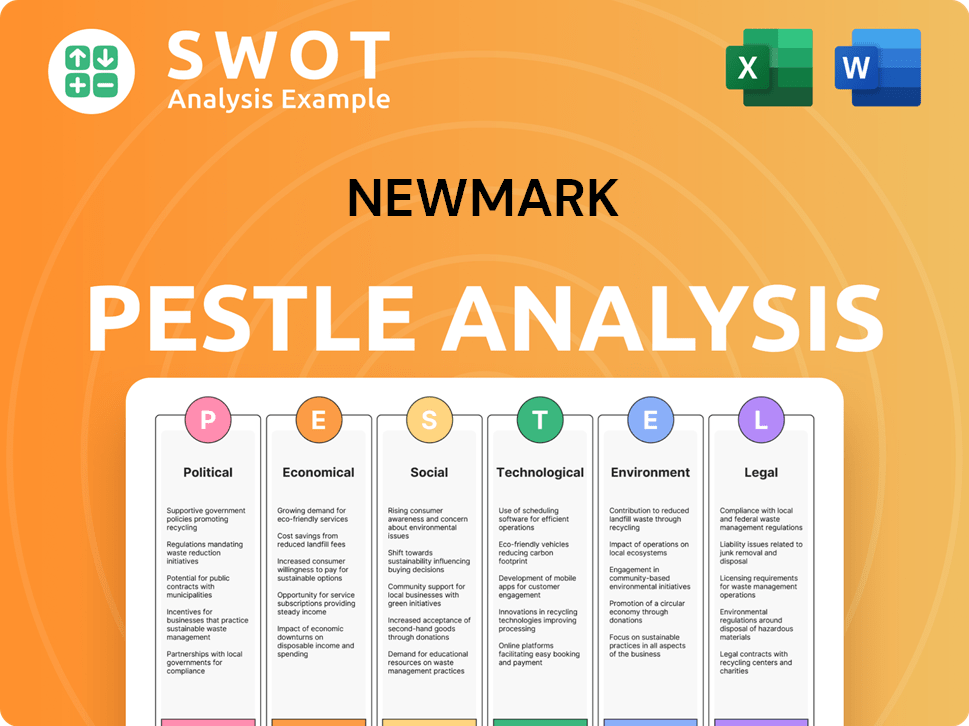
Who Sits on Newmark’s Board?
The current leadership of the Newmark company includes Stephen Merkel as Chairman of the Board of Directors, a role he assumed in February 2025. Kyle Lutnick also joined the board at the same time. Barry Gosin took on the additional role of Chairman of Newmark & Company Real Estate, Inc., the operating company, also in February 2025. In April 2025, Luis Alvarado became the Chief Operating Officer.
The board's composition reflects the influence of major shareholders, particularly those associated with Cantor Fitzgerald, given their significant ownership stake. The board's structure and the presence of key shareholders play a crucial role in the governance and strategic direction of the Newmark company.
| Board Member | Title | Date of Appointment |
|---|---|---|
| Stephen Merkel | Chairman of the Board of Directors | February 2025 |
| Kyle Lutnick | Board Member | February 2025 |
| Barry Gosin | Chairman of Newmark & Company Real Estate, Inc. | February 2025 |
| Luis Alvarado | Chief Operating Officer | April 2025 |
Newmark operates with a dual-class equity structure. As of December 31, 2024, there were 224,490,246 shares of Class A common stock outstanding. Class B common stock, held by Cantor and CFGM as of December 31, 2021, represented approximately 55.8% of the total voting power. This structure gives significant control to the holders of Class B shares. For more information on the company, you can read the Brief History of Newmark.
Newmark's ownership structure is designed to give significant control to certain shareholders. The board of directors includes key figures. The dual-class structure is expected to remain in place.
- Dual-class structure with Class B shares holding significant voting power.
- Current board leadership includes Stephen Merkel as Chairman.
- Cantor Fitzgerald holds a substantial stake, influencing governance.
- The company has not announced any plans to change its dual-class structure.
Newmark Business Model Canvas
- Complete 9-Block Business Model Canvas
- Effortlessly Communicate Your Business Strategy
- Investor-Ready BMC Format
- 100% Editable and Customizable
- Clear and Structured Layout
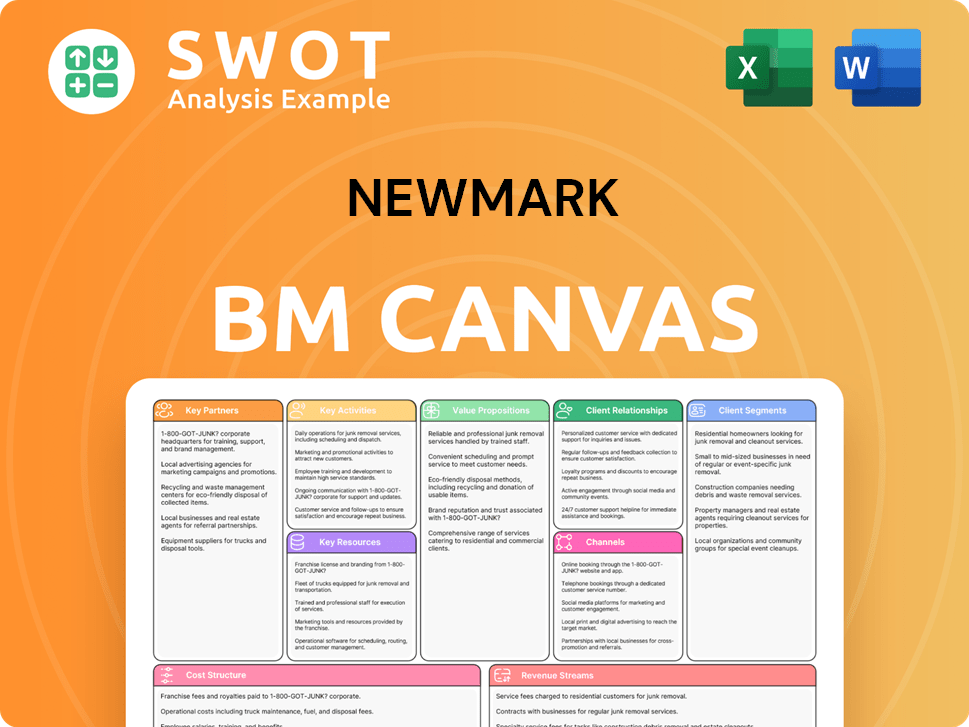
What Recent Changes Have Shaped Newmark’s Ownership Landscape?
Recent developments have significantly reshaped the ownership profile of the Newmark company. A key event occurred on May 19, 2025, when Newmark agreed to repurchase 10,969,523 shares of Class A common stock from Howard W. Lutnick. The repurchase, priced at $11.58 per share, totaled approximately $127 million and was undertaken to comply with Mr. Lutnick's U.S. government ethics agreement. This action divested his ownership, voting, and economic interests in the company. The repurchase was carried out under Newmark's existing stock repurchase authorization, with $244.9 million remaining. Mr. Lutnick also agreed to transfer his Cantor Fitzgerald ownership to trusts for his adult children, with Brandon G. Lutnick as the controlling trustee. These Cantor Fitzgerald transactions are anticipated to conclude in the third quarter of 2025, pending regulatory approvals.
In the context of industry trends, institutional ownership remains substantial, suggesting that the stock price of Newmark is sensitive to institutional trading. As of May 2025, institutional investors held steady at 55.34%, while mutual funds reduced their holdings from 43.58% to 43.08%. Insiders also slightly decreased their holdings from 8.38% to 8.37% in May 2025. The Newmark company is actively investing in growth and returning capital to shareholders through repurchases, driven by expectations of robust cash generation. Furthermore, Newmark has been expanding its global presence, including the acquisition of Gerald Eve and the recent establishment of brokerage operations in France and Germany as of April 2025, with the goal of generating over $2 billion in revenues from recurring businesses within five years. To learn more about the company's strategy, you can explore the Marketing Strategy of Newmark.
| Ownership Category | May 2025 | Change |
|---|---|---|
| Institutional Investors | 55.34% | Unchanged |
| Mutual Funds | 43.08% | Decreased |
| Insiders | 8.37% | Decreased |
The major shareholders of Newmark include institutional investors and mutual funds. The company's ownership structure has seen recent changes, primarily due to regulatory requirements and strategic decisions.
Recent developments include a significant share repurchase from Howard W. Lutnick. This was a strategic move to comply with ethical guidelines. The company is also focused on global expansion.
Institutional investors hold a significant portion of Newmark's shares, indicating a strong institutional interest in the company. This impacts stock price sensitivity.
Newmark is focused on growth, acquisitions, and returning capital to shareholders. The company aims to generate substantial revenue from recurring businesses in the coming years.
Newmark Porter's Five Forces Analysis
- Covers All 5 Competitive Forces in Detail
- Structured for Consultants, Students, and Founders
- 100% Editable in Microsoft Word & Excel
- Instant Digital Download – Use Immediately
- Compatible with Mac & PC – Fully Unlocked
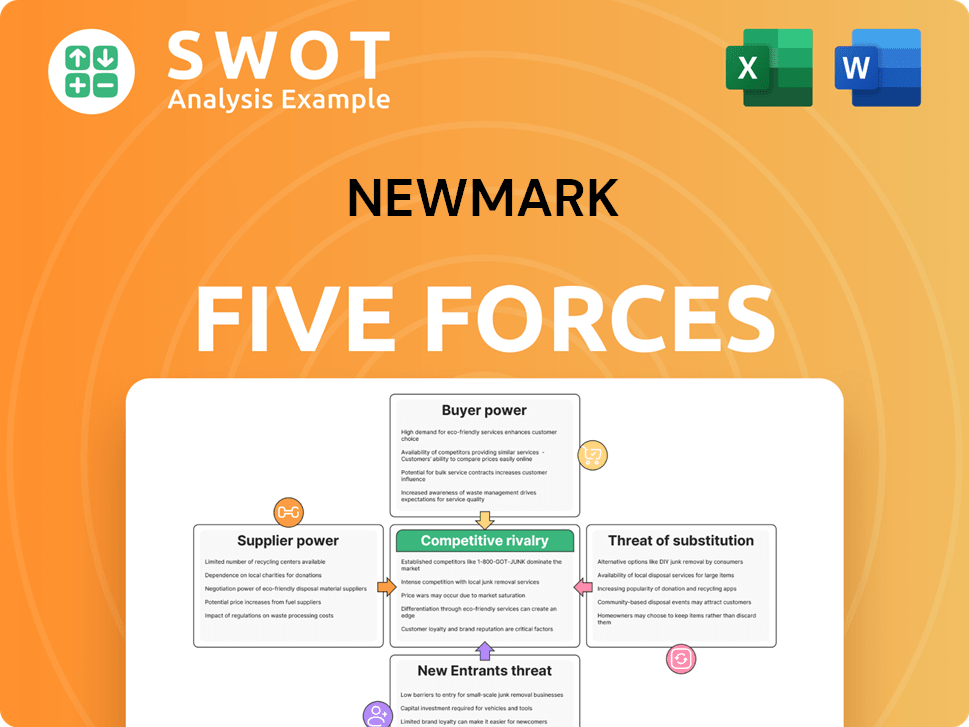
Related Blogs
- What are Mission Vision & Core Values of Newmark Company?
- What is Competitive Landscape of Newmark Company?
- What is Growth Strategy and Future Prospects of Newmark Company?
- How Does Newmark Company Work?
- What is Sales and Marketing Strategy of Newmark Company?
- What is Brief History of Newmark Company?
- What is Customer Demographics and Target Market of Newmark Company?
Disclaimer
All information, articles, and product details provided on this website are for general informational and educational purposes only. We do not claim any ownership over, nor do we intend to infringe upon, any trademarks, copyrights, logos, brand names, or other intellectual property mentioned or depicted on this site. Such intellectual property remains the property of its respective owners, and any references here are made solely for identification or informational purposes, without implying any affiliation, endorsement, or partnership.
We make no representations or warranties, express or implied, regarding the accuracy, completeness, or suitability of any content or products presented. Nothing on this website should be construed as legal, tax, investment, financial, medical, or other professional advice. In addition, no part of this site—including articles or product references—constitutes a solicitation, recommendation, endorsement, advertisement, or offer to buy or sell any securities, franchises, or other financial instruments, particularly in jurisdictions where such activity would be unlawful.
All content is of a general nature and may not address the specific circumstances of any individual or entity. It is not a substitute for professional advice or services. Any actions you take based on the information provided here are strictly at your own risk. You accept full responsibility for any decisions or outcomes arising from your use of this website and agree to release us from any liability in connection with your use of, or reliance upon, the content or products found herein.